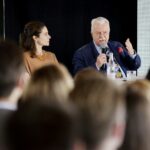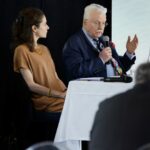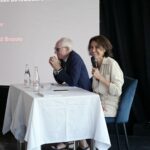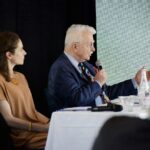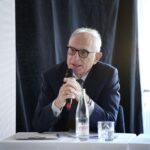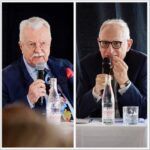 The fourth Emmanuel Gaillard Debate1 took place on 8 July 2025 as part of the 2025 Session of the Arbitration Academy in Paris. The Debate was organized aboard the Diamant Bleu on the Seine and was followed by a two-hour cruise on the river.
The fourth Emmanuel Gaillard Debate1 took place on 8 July 2025 as part of the 2025 Session of the Arbitration Academy in Paris. The Debate was organized aboard the Diamant Bleu on the Seine and was followed by a two-hour cruise on the river.
The topic of the Debate, “Precedent in international arbitration: for whom do arbitrators write?”, witnessed a spirited exchange of theories and opinions between two of the field’s most experienced arbitrators, Professor Luca G. Radicati di Brozolo – Founding Partner, ArbLit (Milan) and Tenant of Fountain Court Chambers (London), and Michael E. Schneider – Senior Counsel and Founding Partner, LALIVE (Geneva). The debate was moderated by Marina Matousekova (Treasurer, Arbitration Academy) and Carine Dupeyron (Secretary General, Arbitration Academy).
Yas Banifatemi (Founding Partner, Gaillard Banifatemi Shelbaya Disputes) delivered the introductory remarks by recalling why the Academy’s tribute to Professor Emmanuel Gaillard (Founding Partner, Gaillard Banifatemi Shelbaya Disputes) has taken the form of a debate, given the skilful and fierce debater that Emmanuel Gaillard was.
The debate commenced by diving right into the heart of the issue: what is precedent in international arbitration, does such a concept even exist, does it have a binding value, does it serve as a mere guidance, or has relevance of a degree somewhere in between the two ends of the spectrum, and for whom do arbitrators draft awards? Michael Schneider opened the debate by arguing that the notion of “precedent” in international arbitration is a misconception, as international arbitration is not a “legal system” but more akin to an “ecosystem” in which the various players operate. In his opinion, there is no reason to impart more relevance to an international commercial arbitration award than one would to a scholarly article. He argued that an award must be delivered solely to resolve the controversy between the parties, and not to contribute to the development of law. Professor Radicati di Brozolo disagreed and argued that if a series of relevant and informative decisions exist, arbitrators should pay heed to them rather than “reinvent the wheel”. In his opinion, paying considerable attention to existing decisions can provide much needed clarifications to unsettled issues of law, fostering legal development, predictability, and consistency.
 On the question whether the possibility of publication of awards influences their style of writing, the debaters agreed on the idea that arbitrators should not write for posterity but should rather focus on resolving the dispute at hand. While concerns regarding a consistent approach to various questions of law may arise in investor-State arbitrations, there is seldom such a need in commercial arbitrations.
On the question whether the possibility of publication of awards influences their style of writing, the debaters agreed on the idea that arbitrators should not write for posterity but should rather focus on resolving the dispute at hand. While concerns regarding a consistent approach to various questions of law may arise in investor-State arbitrations, there is seldom such a need in commercial arbitrations.
When questioned whether they feel “compelled with the pile of awards” that already exist on a given issue, Michael Schneider responded that decisions lacking any reasoning and followed with simplistic repetition, even if a part of the “pile”, should be disregarded. Professor Radicati di Brozolo refined this answer further and differentiated between mechanical repetition and decisions with persuasive legal reasoning. He argued that the latter should be given their due consideration as he would see no reason to depart from such decisions. Michael Schneider added a disclaimer that even consistent prior decisions need to be assessed in the context of the dispute before the arbitrators before placing any reliance on them – decisions are legal system sensitive, and ought to be resolved with that in mind.
The debaters were then asked to share their views on whether arbitrators should apply an applicable law chosen by the parties in the same way the domestic courts would apply. Michael Schneider submitted that if the substantive law of a country has a system of binding precedent, he would be reluctant to apply that law contrary to the prevailing precedent in domestic law. Professor Radicati di Brozolo, on the other hand, opined that arbitrators should not have to apply the domestic law in the same manner as the domestic courts. He supported his position by referencing to the prior practice of Italian Courts applying the Vienna Convention on the International Sale of Goods to warranties given by a seller, whereas arbitral tribunals faced with the same issue decided differently and in a manner that was better aligned with the business realities. This prompted the Italian Court of Cassation to eventually change course by drawing inspiration from the diverging but informative tribunal practice on the issue. On this the debaters found common ground with Michael Schneider responding in agreement.
 To conclude, the debaters were asked to share their views on the core issue of the debate – who do they have in mind when they draft their awards, and whether they consider the possibility of developing a body of arbitral caselaw when ruling on a certain dispute. Michael Schneider stated that his primary concern is to draft for the parties before him. He also stressed that arbitrators should “keep an open mind” as they draft for the ecosystem of international arbitration that features a host of diverse stakeholders. Professor Radicati di Brozolo agreed with the need to keep an open mind. He believes that a consistent and legally plausible approach to decision making has helped in clarifying various issues that were once unsettled in practice. To conclude, he stated that with many attacks that the system of international arbitration today faces, reasoned predictability in arbitral decisions would assist in strengthening the legitimacy of the system.
To conclude, the debaters were asked to share their views on the core issue of the debate – who do they have in mind when they draft their awards, and whether they consider the possibility of developing a body of arbitral caselaw when ruling on a certain dispute. Michael Schneider stated that his primary concern is to draft for the parties before him. He also stressed that arbitrators should “keep an open mind” as they draft for the ecosystem of international arbitration that features a host of diverse stakeholders. Professor Radicati di Brozolo agreed with the need to keep an open mind. He believes that a consistent and legally plausible approach to decision making has helped in clarifying various issues that were once unsettled in practice. To conclude, he stated that with many attacks that the system of international arbitration today faces, reasoned predictability in arbitral decisions would assist in strengthening the legitimacy of the system.
Please find below the video of the lecture, and a selection of photos.
1. Recordings of previous Emmanuel Gaillard debates can be viewed here:
The first Debate was held on 12 July 2022 on the topic of “Arbitrator’s Jurisdiction: Who decides?”, between Dr.Yas Banifatemi, Founding Partner of Gaillard Banifatemi Shelbaya Disputes, and Professor George A. Bermann of Columbia Law School.
The second Debate took place on 12 July 2023. Professor Andrea Bjorklund of McGill University Faculty of Law, and Mohamed Shelbaya, Founding Partner of Gaillard Banifatemi Shelbaya Disputes, exchanged their views on “Shareholder claims: What’s wrong with them?”.
The third Debate was held on 26 June 2024 and focused on “Is the finality of arbitral awards an essential attribute of international arbitration?”. The debaters included Shane Spelliscy, Director General of the Trade Law Bureau of the Government of Canada, Deputy Legal Adviser at Global Affairs Canada, and Chairman of the UNCITRAL Working Group III on Investor-State Dispute Settlement Reform, and Benjamin Siino, Founding Partner of Gaillard Banifatemi Shelbaya Disputes.
To find out more about Emmanuel Gaillard’s writings, please refer to his extensive bibliography.


